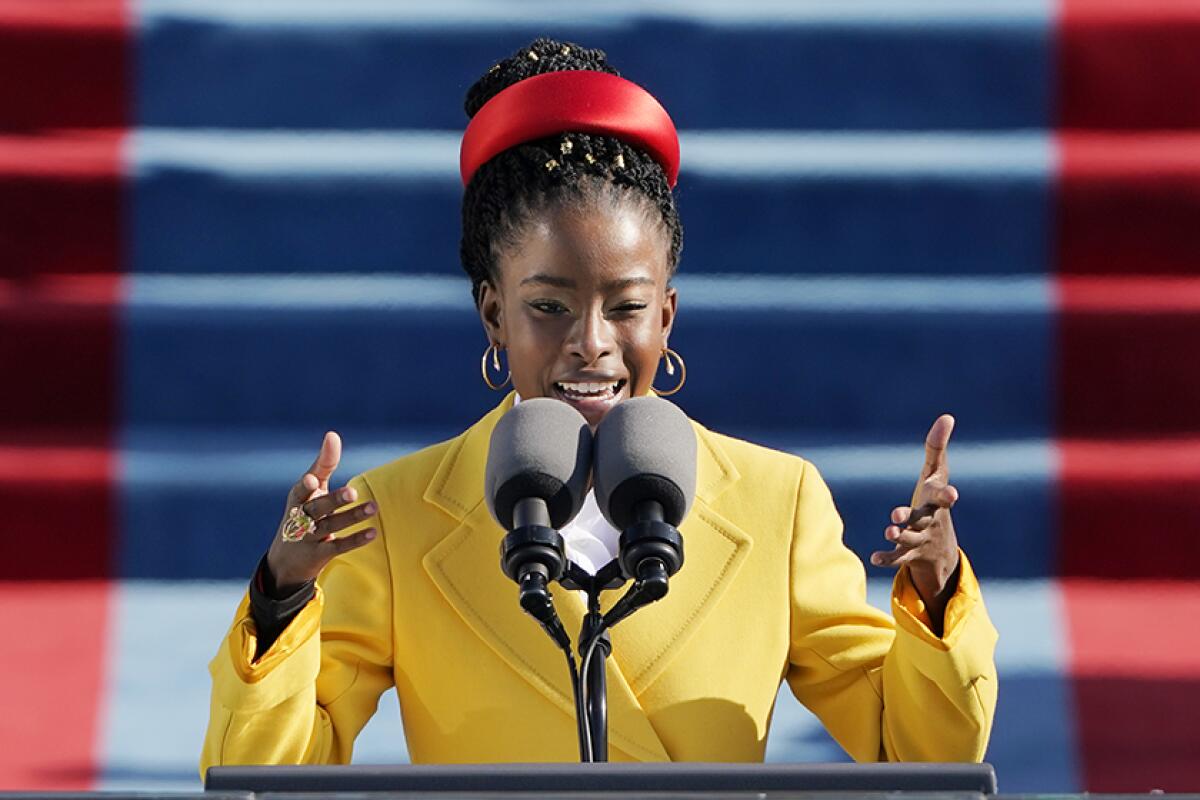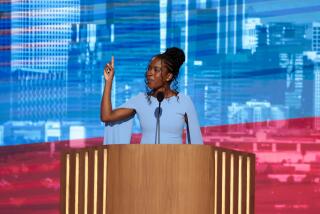Meet Amanda Gorman’s California successor as youth poet laureate: Alexandra Huynh
- Share via
Early this year, when Amanda Gorman read “The Hill We Climb” at President Biden’s inauguration, it was a watershed moment on many fronts: a signal of unity in the wake of the Capitol attack; the emergence of a rising star at the age of 22, the youngest-ever person to become an inaugural poet; and a national spotlight on a new position of growing prominence: the national youth poet laureate.
Gorman was the first to hold that title, and last month she was succeeded by an 18-year-old with similar promise, Alexandra Huynh.
Huynh, an incoming first-year student at Stanford University, was raised by Vietnamese American immigrant parents in Sacramento — an experience that played a significant role in her poetry and her mission to connect cultures and work toward justice.
“When you hear the word ‘California,’ most people’s attention goes to Los Angeles or San Francisco,” Huynh said during a video interview earlier this month.
“But I think that I have been incredibly privileged to grow up in Sacramento, because it’s home to such a diverse community of people of all races and ethnicities, but also backgrounds. Growing up in Sacramento has allowed me to move through the world with a greater appreciation for people and their stories.”
She became the national youth poet laureate at age 16; six years later, she read her poem at Joe Biden’s and Kamala Harris’ historic swearing-in.
Huynh said she was shy at the beginning of high school, but that changed when she realized she wasn’t alone. “I only discovered that Sacramento had a poetry community in my junior year,” she said. “Ever since then, I have just felt so welcome and so at home. Being a part of that community has contributed to my comfort and courage in sharing my story on a national stage.”
Now she sees her poetry as a way of paying homage to a family, a culture and a city for the values they have infused. “Vietnamese culture has taught me that family and community are the most important things because they make the highs higher and the lows not as low,” she says. “It’s really important for me to honor the culture that I’ve been brought up in.”

From a very young age, Huynh loved to sing. Her mother enrolled her in lessons.
“I remember, at the beginning of each lesson, my teacher had this huge songbook and I had to choose what songs I wanted to sing for that day,” she said. “After a while, I remember thinking to myself, these songs are a little bit boring and I don’t know any of them, honestly, so why can’t I just write my own songs? And one day, I did.”
Huynh remembers picking up some scrap paper and writing down lyrics. It began with the impulse to something no one else could — something authentically hers.
“The driving factor behind me putting pen to paper is knowing that no one is going to be able to get inside of my head and articulate my experiences as far as I can,” she said. “And it brings me great comfort to know that I have been spoken for on my own terms.”
“It does not matter any longer where you live,” reads the title and opening line of one of Huynh’s poems, which kicks off each stanza with a headline “from news reports on the fires in California and the floods in Vietnam.” Huynh juxtaposes flame and water, rendering both emergencies with heartbreaking imagery, linking climate disaster and colonial devastation, mourning both the drowned land of her ancestors and the smoldering state where she’s grown up.
The road to being a youth poet laureate is a long one, at least in the timespan of teenager.
The youth poet laureate program was launched in New York City by the literary arts organization Urban Word in 2008. In 2014, the program expanded to Los Angeles, with Gorman becoming the city’s inaugural youth poet laureate. After expanding into dozens of cities, in 2017 the organization selected a national youth poet laureate from among finalists ages 13 to 19 across four regions of the United States who were youth poet laureates in one of 41 participating cities.
Although candidates are evaluated on the strength of their poetry, judges don’t just seek great talent; they are looking for community leaders — young people who can amplify other voices in their regions and communities.
L.A. poet laureate Robin Coste Lewis joins the L.A. Times Book Club Sept. 24 for Black Poets in a Time of Unrest, an evening of discussion and poetry performances.
Huynh believes it’s quite fitting that both she and Gorman are from California.
“California is home to one of the most diverse populations in the United States, and I think with those backgrounds comes the appreciation for art and also for storytelling,” she said. “I think that that’s something you can find in California almost wherever you go.”
With that said, Huynh is driven by a passion for inclusivity — and for changing the world in whatever way she can. She is planning on majoring in engineering at Stanford — a fact that may surprise some readers. But Huynh believes the fields intersect.
“While my interests are different, I would say that they all are connected to each other in the ways that I want to use them to help people live the healthy and dignified life that they deserve. I think that I might look into becoming an urban planner or a civil engineer to create a city where people can interact in a way that is not only productive, but really conducive to joy.”
Both fields, after all, involve the construction of inventions never thought possible. “I want to be a world builder,” she says, “someone who really makes people feel safe not only for themselves, but to imagine a future that is best for themselves and their loved ones.”
Huynh’s poetry focuses on climate change, marginalized communities, cultural touchstones and more. She mindfully looks to the past, present and future for guidance and inspiration.
Those influences include mentors like Sarah Kay, who made her feel that her stories were worth telling. Huynh, in turn, has advice for others.
Amanda Gorman captivated the world with her poem at President Joe Biden’s inauguration.
“I want to encourage every person, young or old, to know that you don’t have to be recognized by any panel of judges or have any sort of accolades for your writing to matter,” she said. “I think the simple fact that you’re able to document your story in your own words is miraculous in and of itself, because no one can tell your story like you can.”
Huynh is looking forward to college after a very eventful year. “These few months have just been a whirlwind,” she said, “and I’m still processing and reflecting and seeing all the places that my love for poetry has grown from.” It would seem that she’s just getting started.
More to Read
Sign up for our Book Club newsletter
Get the latest news, events and more from the Los Angeles Times Book Club, and help us get L.A. reading and talking.
You may occasionally receive promotional content from the Los Angeles Times.








